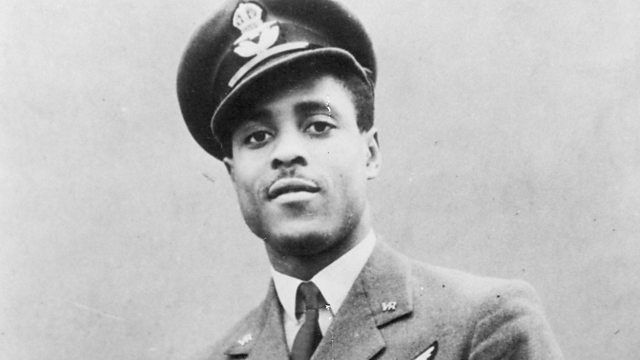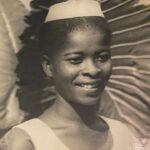Johnny Smythe was one of very few West Africans to fly with Britain’s air force during the Second World War and his son, Eddie Smythe shares his story; for too long has passed for many stories to remain untold.
A Sierra Leonean, Johnny Smythe was working in a government clerical job in Sierra Leone when WWII broke out and when the fighting started, only men conscripted of European descent could join the Royal Air Force.
But as allied casualties mounted the rules were changed.
In 1941, Britain called on its West African colonies to support the war effort and Johnny was all too keen to volunteer.
“My father saw this as an opportunity. I suppose to do something fairly exciting. But he also wanted to make a contribution in the effort because after all, he was fighting at the time for his king, George VI. So along with hundreds of young men at the time, they filled out application forms and he wanted to go into the RAF,” says Eddie Smythe.
Only five of the applicants were picked and in October 1941 they were given a rousing sendoff as they left Freetwon by ship for the United Kingdom.
Johnny stood out during his RAF training.
In his camp there were about 64 trainees and he was one of six that qualified as an officer which absolutely amazed him and delighted him.
Despite there not being any black people there with him, to Johnny, it didn’t make any difference: “everyone was treated exactly the same and strange enough it was some of his happiest times,” according to Eddie.
Johnny, a nearly qualified lieutenant was soon embarking on bombing missions over Europe. As the navigator, he was also second-in-command.

“It wasn’t a very comfortable place to be in a bomber, particularly the Stirling. These planes were unpressurised. There was no heating, and they were very cramped. My father was 6’4 so he was quite a tall man which meant a lot of bending, a lot of stooping in very very clamped and cold places. And of course, you had anti-aircraft fire exploding around the plane.”
Johnny’s plane was hit by enemy fire on numerous occasions but somehow he always made it home. The Sierra Leonean navigator became known as a bit of a lucky charm.
“My father had completed 26 missions and started to have that feeling of invulnerability which I guess young men have. Also a lot of his colleagues started to feel, ‘this guy, this black guy, every time he goes out, doesn’t matter what plane he goes out in, he seems to come back. There must be something about him, some sort of black magic around him.’ He used to joke about it, laughed Eddie. “The joke was, ‘let’s fly with Johnny, he’s always going to come back’”.
But on his 27th mission things changed. On the 18th of November 1943, Johnny’s plane took off with hundreds of other allied aircrafts for the first night of the Battle of Berlin.
On the way there, the aircraft was struck by anti-aircraft fire from the ground. The shell burst beneath the plane and it exploded shrapnel through the fuselage, knocked out one of the engines and was now only relying on three.
Johnny sustained injury, two pieces of shrapnel went through him; one through his groin and one through his side, he was bleeding quite profusely.
The crew flew on to their target and dropped their bombs but as they flew back over Germany they were attacked again.
“The plane was handicapped so this Night Fighter picked it up and started strafing it. It started flying round it and strafing it. Basically, the plane was on fire. The captain realised he could not be saved and he gave the order to bailout,” Eddie tells.
Johnny was the second last man to jump and he landed in some woods.
“He hid his parachute and he saw some light in the distance, it was some sort of tavern. And outside the tavern there were some bicycles. He stole a bicycle and cycled off along the road. Now he had lost a lot of blood by this stage. Then he saw a barn, threw the bicycle into a river and he went and hid. Later on that night he heard some German voices outside. They started shouting out, ‘Come out!’ Initially he didn’t move and they started shooting into the barn so he came out and held his hands up.”
“They looked at this man, he was six foot four, a black man in an officer’s RAF uniform and they said to him, ‘What are you doing here? How come you’ve got an RAF uniform on, you’re from Africa?’ and he said, ‘I’m from Sierra Leone and I’m here fighting for my king.’”
Johnny Smythe was interrogated and then taken to hospital.
“He said there were a couple of German officers in the hospital who were also being treated for wounds and he ended up having a conversation with one of them. And this officer said to him, ‘Johnny you know you are lucky. Once you are treated you will go into a prisoner of war camp and you will see your days out in that camp until the end of the war. He said for me, ‘I am also going to be treated and then I’m going straight back into the war and I will probably end up being killed’.”
They were quite powerful words because despite which side the soldiers were fighting on they were all just people.
Johnny was finally transported to Stalag Luft I, a prisoner of war camp in Northern Germany where he would remain for the next 18 months.
“I think life as a prisoner of war in those camps would be quite monotonous. But there were incidents where people were beaten, there were incidents where people were shot. I did ask him if there were always plans to escape and he said oh yes. We were always planning routes, digging tunnels. It was something you work on all the time.”
“He told me about quite a funny incident where an American chap managed to escape, he got over the fence and managed to escape but he was subsequently caught and brought back.
The commander had asked him how he managed to escape and he said ‘I vaulted over the fence’.
‘Impossible!’ The commander exclaimed.
‘Yes I did, the American POW said. ‘Well prove you can do it and if you can we’ll let you go,’ the commander responded. Basically this american, ran, did a flip and actually vaulted the fence. They didn’t let him go, but there was laughing and clapping and cheering not only from the prisoners but also from the guards.”
But for fairly obvious reasons Johnny never tried to escape himself. Eddie remembers the explanation he gave:
“He was interviewed by a reporter from the Times Newspaper who asked him this very interesting question and said, ‘if I had managed to get out I would not have been able to mingle with other 6’4 black men in Germany at the time. I think I would’ve stood out like a sore thumb’. To which the reporter said, ‘yes, I see your point’.”
The POW camp officers tried to use propaganda to demoralize prisoners’ view of the war but when the prisoners managed to build a radio with the little resources they had in the camp, as the months passed they learnt that the Germans were losing the war and the Allies were closing in.
“Their biggest fear was that the guards might seek to shoot them, might kill and burn the camps before they [Allies] got there. Fortunately, this never happened. They woke up one morning and the guards were gone. It was just eerie silence. They came out, the gates were opened and there was no figure of authority around.”
It was over.
Johnny went back to Britain after the war but later returned to Sierra Leone for a career in law where he eventually became the country’s attorney General. When he retired he moved back to England to live near his son in Oxfordshire until his death in 1995. It was only in his final years that Eddie was able to learn about his father’s life. He has now found his own way to celebrate his father through song.
“I’m very proud of him and because I feel it’s a story that’s worth telling and it’s the same for all the people who fought in the conflict. It’s good that we never ever forget.”














